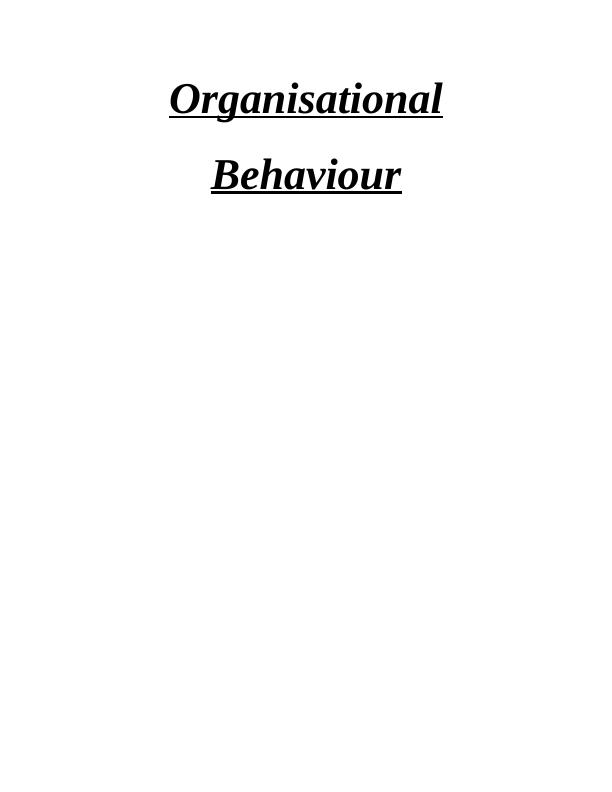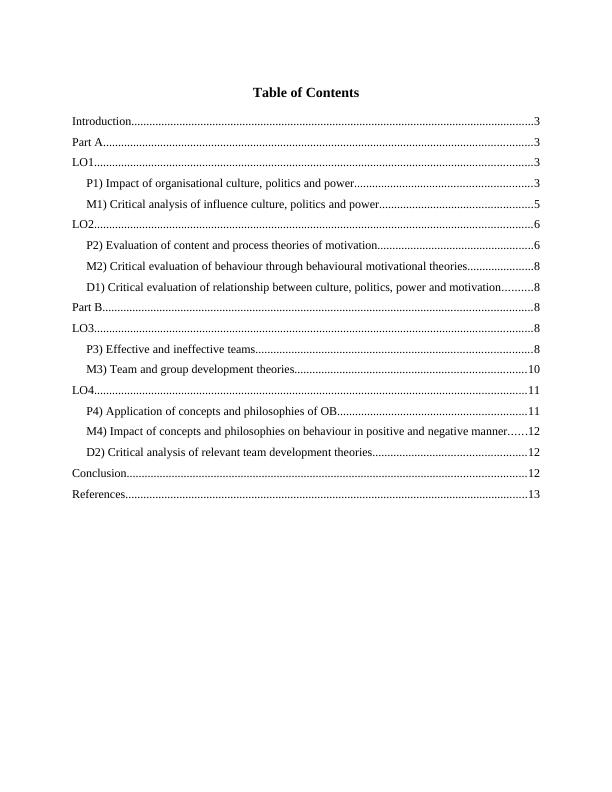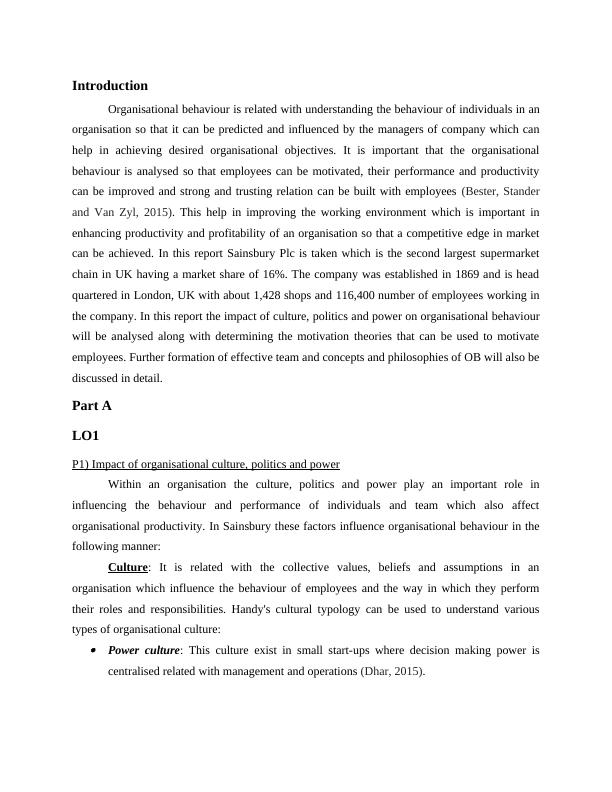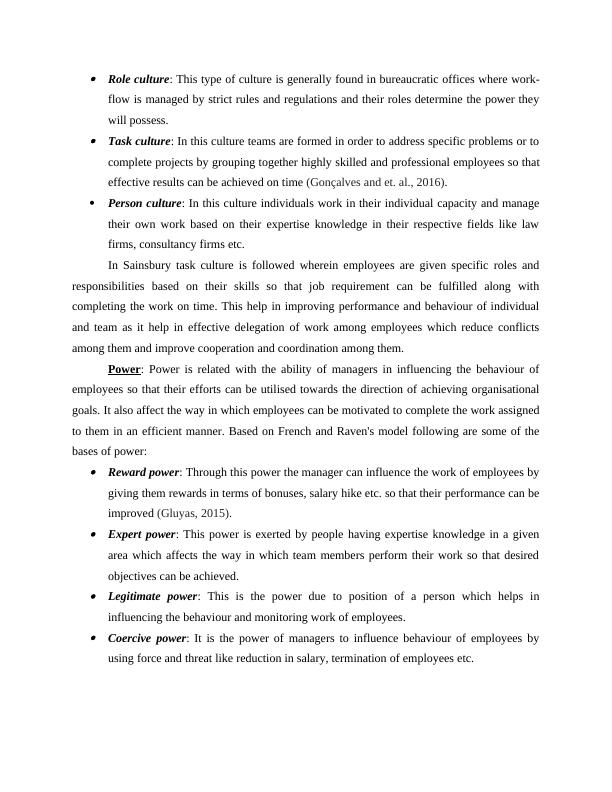Impact of Organisational Culture, Politics and Power on Behaviour and Motivation
Added on 2023-01-06
14 Pages4228 Words50 Views
Organisational
Behaviour
Behaviour

Table of Contents
Introduction......................................................................................................................................3
Part A...............................................................................................................................................3
LO1..................................................................................................................................................3
P1) Impact of organisational culture, politics and power...........................................................3
M1) Critical analysis of influence culture, politics and power...................................................5
LO2..................................................................................................................................................6
P2) Evaluation of content and process theories of motivation....................................................6
M2) Critical evaluation of behaviour through behavioural motivational theories......................8
D1) Critical evaluation of relationship between culture, politics, power and motivation..........8
Part B...............................................................................................................................................8
LO3..................................................................................................................................................8
P3) Effective and ineffective teams............................................................................................8
M3) Team and group development theories.............................................................................10
LO4................................................................................................................................................11
P4) Application of concepts and philosophies of OB...............................................................11
M4) Impact of concepts and philosophies on behaviour in positive and negative manner......12
D2) Critical analysis of relevant team development theories...................................................12
Conclusion.....................................................................................................................................12
References......................................................................................................................................13
Introduction......................................................................................................................................3
Part A...............................................................................................................................................3
LO1..................................................................................................................................................3
P1) Impact of organisational culture, politics and power...........................................................3
M1) Critical analysis of influence culture, politics and power...................................................5
LO2..................................................................................................................................................6
P2) Evaluation of content and process theories of motivation....................................................6
M2) Critical evaluation of behaviour through behavioural motivational theories......................8
D1) Critical evaluation of relationship between culture, politics, power and motivation..........8
Part B...............................................................................................................................................8
LO3..................................................................................................................................................8
P3) Effective and ineffective teams............................................................................................8
M3) Team and group development theories.............................................................................10
LO4................................................................................................................................................11
P4) Application of concepts and philosophies of OB...............................................................11
M4) Impact of concepts and philosophies on behaviour in positive and negative manner......12
D2) Critical analysis of relevant team development theories...................................................12
Conclusion.....................................................................................................................................12
References......................................................................................................................................13

Introduction
Organisational behaviour is related with understanding the behaviour of individuals in an
organisation so that it can be predicted and influenced by the managers of company which can
help in achieving desired organisational objectives. It is important that the organisational
behaviour is analysed so that employees can be motivated, their performance and productivity
can be improved and strong and trusting relation can be built with employees (Bester, Stander
and Van Zyl, 2015). This help in improving the working environment which is important in
enhancing productivity and profitability of an organisation so that a competitive edge in market
can be achieved. In this report Sainsbury Plc is taken which is the second largest supermarket
chain in UK having a market share of 16%. The company was established in 1869 and is head
quartered in London, UK with about 1,428 shops and 116,400 number of employees working in
the company. In this report the impact of culture, politics and power on organisational behaviour
will be analysed along with determining the motivation theories that can be used to motivate
employees. Further formation of effective team and concepts and philosophies of OB will also be
discussed in detail.
Part A
LO1
P1) Impact of organisational culture, politics and power
Within an organisation the culture, politics and power play an important role in
influencing the behaviour and performance of individuals and team which also affect
organisational productivity. In Sainsbury these factors influence organisational behaviour in the
following manner:
Culture: It is related with the collective values, beliefs and assumptions in an
organisation which influence the behaviour of employees and the way in which they perform
their roles and responsibilities. Handy's cultural typology can be used to understand various
types of organisational culture: Power culture: This culture exist in small start-ups where decision making power is
centralised related with management and operations (Dhar, 2015).
Organisational behaviour is related with understanding the behaviour of individuals in an
organisation so that it can be predicted and influenced by the managers of company which can
help in achieving desired organisational objectives. It is important that the organisational
behaviour is analysed so that employees can be motivated, their performance and productivity
can be improved and strong and trusting relation can be built with employees (Bester, Stander
and Van Zyl, 2015). This help in improving the working environment which is important in
enhancing productivity and profitability of an organisation so that a competitive edge in market
can be achieved. In this report Sainsbury Plc is taken which is the second largest supermarket
chain in UK having a market share of 16%. The company was established in 1869 and is head
quartered in London, UK with about 1,428 shops and 116,400 number of employees working in
the company. In this report the impact of culture, politics and power on organisational behaviour
will be analysed along with determining the motivation theories that can be used to motivate
employees. Further formation of effective team and concepts and philosophies of OB will also be
discussed in detail.
Part A
LO1
P1) Impact of organisational culture, politics and power
Within an organisation the culture, politics and power play an important role in
influencing the behaviour and performance of individuals and team which also affect
organisational productivity. In Sainsbury these factors influence organisational behaviour in the
following manner:
Culture: It is related with the collective values, beliefs and assumptions in an
organisation which influence the behaviour of employees and the way in which they perform
their roles and responsibilities. Handy's cultural typology can be used to understand various
types of organisational culture: Power culture: This culture exist in small start-ups where decision making power is
centralised related with management and operations (Dhar, 2015).

Role culture: This type of culture is generally found in bureaucratic offices where work-
flow is managed by strict rules and regulations and their roles determine the power they
will possess. Task culture: In this culture teams are formed in order to address specific problems or to
complete projects by grouping together highly skilled and professional employees so that
effective results can be achieved on time (Gonçalves and et. al., 2016).
Person culture: In this culture individuals work in their individual capacity and manage
their own work based on their expertise knowledge in their respective fields like law
firms, consultancy firms etc.
In Sainsbury task culture is followed wherein employees are given specific roles and
responsibilities based on their skills so that job requirement can be fulfilled along with
completing the work on time. This help in improving performance and behaviour of individual
and team as it help in effective delegation of work among employees which reduce conflicts
among them and improve cooperation and coordination among them.
Power: Power is related with the ability of managers in influencing the behaviour of
employees so that their efforts can be utilised towards the direction of achieving organisational
goals. It also affect the way in which employees can be motivated to complete the work assigned
to them in an efficient manner. Based on French and Raven's model following are some of the
bases of power: Reward power: Through this power the manager can influence the work of employees by
giving them rewards in terms of bonuses, salary hike etc. so that their performance can be
improved (Gluyas, 2015). Expert power: This power is exerted by people having expertise knowledge in a given
area which affects the way in which team members perform their work so that desired
objectives can be achieved. Legitimate power: This is the power due to position of a person which helps in
influencing the behaviour and monitoring work of employees. Coercive power: It is the power of managers to influence behaviour of employees by
using force and threat like reduction in salary, termination of employees etc.
flow is managed by strict rules and regulations and their roles determine the power they
will possess. Task culture: In this culture teams are formed in order to address specific problems or to
complete projects by grouping together highly skilled and professional employees so that
effective results can be achieved on time (Gonçalves and et. al., 2016).
Person culture: In this culture individuals work in their individual capacity and manage
their own work based on their expertise knowledge in their respective fields like law
firms, consultancy firms etc.
In Sainsbury task culture is followed wherein employees are given specific roles and
responsibilities based on their skills so that job requirement can be fulfilled along with
completing the work on time. This help in improving performance and behaviour of individual
and team as it help in effective delegation of work among employees which reduce conflicts
among them and improve cooperation and coordination among them.
Power: Power is related with the ability of managers in influencing the behaviour of
employees so that their efforts can be utilised towards the direction of achieving organisational
goals. It also affect the way in which employees can be motivated to complete the work assigned
to them in an efficient manner. Based on French and Raven's model following are some of the
bases of power: Reward power: Through this power the manager can influence the work of employees by
giving them rewards in terms of bonuses, salary hike etc. so that their performance can be
improved (Gluyas, 2015). Expert power: This power is exerted by people having expertise knowledge in a given
area which affects the way in which team members perform their work so that desired
objectives can be achieved. Legitimate power: This is the power due to position of a person which helps in
influencing the behaviour and monitoring work of employees. Coercive power: It is the power of managers to influence behaviour of employees by
using force and threat like reduction in salary, termination of employees etc.

End of preview
Want to access all the pages? Upload your documents or become a member.
Related Documents
Impact of Organisational Culture, Politics and Power on Behaviour and Motivation in Sainsbury Plclg...
|14
|4229
|385
Unit 12 –Organisational Behaviourlg...
|15
|4915
|43
Organisational Behavior (OB)- PDFlg...
|15
|4665
|258
Organisational Behaviour: Culture, Politics, Power, and Motivation Theorieslg...
|15
|4689
|80
Influence of Organizational Culture, Power, and Politics on Individual and Team Behaviorlg...
|17
|5674
|54
Ineffective v/s Effective teamlg...
|18
|5719
|48
